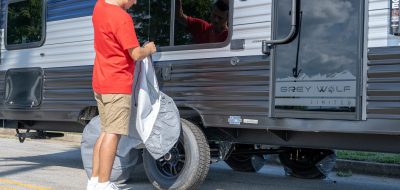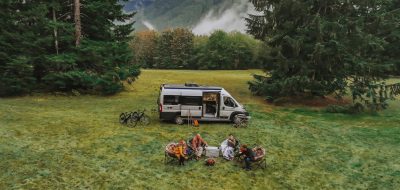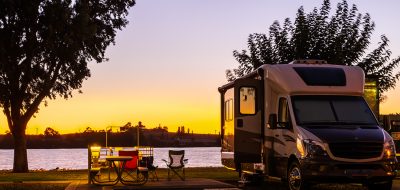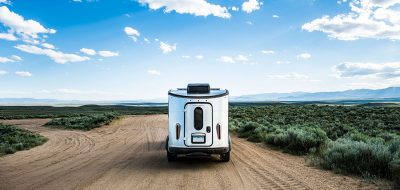By Bob Difley
 Already we’re three-quarters of the way through July in a year that could be the hottest on record. The bark beetle is killing trees in western forests. Fire prone tinder is building up on the forest floor. And the dry, hot weather will soon bring on wildfire season.
Already we’re three-quarters of the way through July in a year that could be the hottest on record. The bark beetle is killing trees in western forests. Fire prone tinder is building up on the forest floor. And the dry, hot weather will soon bring on wildfire season.
This is when we RVers must be especially careful with campfires and barbecues. Brock Astel, who is public affairs officer for the Idaho Bureau of Land Management, said that of the 32 fires reported in south-central Idaho this year, 17 were human-caused. Surprisingly, he pointed out that one of the major causes comes from vehicles: dragging equipment, blown tires, or bad wheel bearings can send sparks into and ignite dry grass.
There have been four fires this season in Ketchum and the Sawtooth National Recreation Area, three of which were caused by humans, two by campers. One emptied hot charcoal briquettes into a dry area, and one lit a “flash pile” composed of small limbs that are by-products of firewood collecting.
Not that RVers would ever do dumb things like that, but we still need to take the proper precautions when boondocking to assure that none of our actions are the cause of a forest conflagration. Some forests during the dry season require a fire permit if you are going to build a fire or use a barbecue.
The permit is free and is issued by the forest service office or by a ranger when he visits your campsite. He will explain basic fire safety rules and check whether you have a bucket (for dumping water on a fire) and a shovel. A folding camp or military “entrenching tool” is OK. He will probably also advise you that failure to extinguish a campfire is a federal violation that can result in a hefty fine.And make sure you have a full water tank, just in case . . .
When retiring for the night or leaving your campsite, make sure your campfire is completely out and cold. Touch the coals. Winds can spring up at any time, resuscitating a fire and blowing hot sparks around. When you leave shovel dirt over your dead fire. And remember, don’t throw un-burnable things–cans, bottles, tinfoil, plastic–in the fire.
And for your own safety and comfort, check National Interagency Fire Center website for an up-to-the-minute report on fires, closed areas, weather forecasts, and other important news. You do not want to camp in an area threatened by an advancing wildfire, nor do you want to be downwind of a burning fire even miles away. The smoke will make you very uncomfortable and can cause respiratory problems–besides possibly getting in the way of firefighters.
For more on boondocking, check out my ebook, BOONDOCKING: Finding the Perfect Campsite on America’s Public lands.
Website: Healthy RV Lifestyle







Pingback: www
Bob Difley
Thanks for the comments. If yu want to experience (virtually) what a forest service firefighter’s work life is like, read one of these: “Fire” by Sebastian Junger and “Firestorm” by Nevada Barr, or read about one of the most dangerous occupations on earth at http://en.wikipedia.org/wiki/Smokejumper.
Jim G
Rich provides some sobering food for thought which I sincerely hope would dissaude anyone from being irresponsible enough to cause a devastating wildfire. Until I read his post I was unaware of the financial aspect and although he did not include any statistics I hope that the insurance companies/agencies are successful in recouping some of the costs involved. Of course there is another aspect associated with wildfires, the risk to those who are the fire-fighting heros! So when you consider everything involved, prevention is key and certainly a very easy and the right thing to do. Okay, I have rambled on enough
Rich S.
There is another side to wildland fire safety that wasn’t discussed. If you cause or contribute to the spread of a wildfire you may receive a letter of demand from the fire agency for the cost of fire suppression. These demands can range from thousands to hundreds of millions of dollars. I am a post wildfire consultant and work with insurance companies to reduce the cost collectible by the fire agency. New law also allows Federal agencies to recover the cost of reforestation … running into the $100’s of millions. Be safe and play safe!
Don H.
This is the hot subject every summer season. That is a good thing, because it remindes people about fire saftey and such. And fire always get started by somebody not thinking clearly or just don’t care. Just stop, think and double check you fire pit or BBQ when leaving, don’t say “OOOPS”.